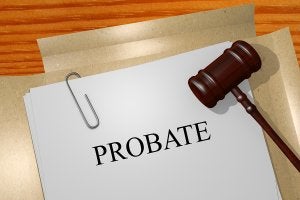-
Reasons Your Attorney May Suggest a Probate Bond
A probate bond is much like an insurance policy that protects the beneficiaries of an estate from acts of wrongdoing. If an estate or an executor is required to obtain a probate bond in The Woodlands, the issuer of the bond agrees to compensate the beneficiaries if a financial loss results from errors committed by the executor. The process of obtaining a probate bond can be complicated, but there are several reasons why your probate lawyer may recommend that you obtain one.

You would like to give your beneficiaries peace of mind
The process of obtaining a probate bond can be long and arduous, and the premiums can be prohibitively expensive. For these reasons, many testators choose to waive the bond requirement. But in some cases, requiring a probate bond is a wise move because it can grant peace of mind to your beneficiaries as well as to the executor over the estate. With a probate bond, heirs can rest assured that they will receive the assets to which they are entitled under the terms of your will. You may also enjoy peace of mind knowing that your heirs will be properly taken care of after you have passed on.
Your chosen executor is also an heir
A conflict of interest can arise when a designated executor is expected to receive an inheritance. Even if you trust your executor to faithfully carry out the duties required of him or her, the other beneficiaries may not necessarily be quite as trusting. Oftentimes, requiring a probate bond can help preserve harmony within the family.
The estate holds substantial assets
Probate courts are more likely to require that a bond be obtained if the estate holds significant assets. When greater financial gain is at stake, the possibility of fraudulent activity tends to increase. Additionally, a significant estate may lend itself to a greater chance of making unintentional errors that may cost your beneficiaries part of their inheritance.
You expect to leave unsecured debts behind
Unsecured debts are those that are not attached to collateral. These include credit card bills or medical debts. If there is a possibility that you will leave substantial unsecured debts when you pass on, requiring a probate bond can be a smart decision.
-
What Is Power of Attorney?
Power of attorney is a designation that allows someone to make decisions for someone else—to act on their behalf. Generally speaking, when a person becomes incapacitated, he or she is no longer able to make legal and financial decisions on his or her own behalf. In such cases, a power of attorney can serve as a useful tool. It is possible for the court in Houston to appoint someone to make these decisions for the individual, but this is usually not the preferred situation as it is both cumbersome and costly. By designating power of attorney to a close family member or friend, the afflicted individual will have peace of mind knowing that, in the event of incapacitation, important decisions will be made by a trusted person.
When someone is granted power of attorney, the designation may go into effect immediately or it may not go into effect until the grantor becomes incapacitated. Be careful, individuals who hold another’s power of attorney have a legal duty to act in good faith when managing the grantor’s financial assets and legal matters. It is possible for legal action to be taken if a person with power of attorney is alleged to have mismanaged the grantor’s affairs.

-
Probate Spotlight: Disputing an Inheritance
The act of contesting a will in The Woodlands is often seen in an unfavorable light. Opinionated individuals may feel that contesting a will is disrespectful to the decedent, or is, perhaps, little more than an attempt to obtain more financial assets. In fact, estate law does allow legal grounds for challenging a will, with good reason. People who are elderly, in poor health, or otherwise vulnerable may be taken advantage of by non-family caregivers or other individuals. So when a will truly isn’t valid, then the rightful beneficiaries may not receive the inheritance that the decedent desired.
Time Limits

If you suspect that your loved one’s will is invalid, it’s always in your best interests to consult an estate lawyer right away. There are certain time limits to contesting a will. If you know that you are an heir, the deadline is two years from the date that the will was admitted to probate. If you didn’t know that you are an heir, such as if you’ve only recently discovered your birth parents, you have four years to file a challenge from the date at which the estate was closed. Minors must file a challenge within two years from the date of their majority.
Improper Execution
One of the grounds for challenging the validity of a will is that the document was improperly executed. For example, if it is a holographic will, it might not have been written entirely in the decedent’s handwriting. If it is an attested will, it might not have been signed by the necessary witnesses, or that the witnesses were disqualified by law from acting as witnesses.
Undue Influence
Wills are intended to carry out the wishes of the decedent after his or her death, but sometimes they can be unduly influenced by other parties. Your attorney may argue that the will is invalid because another person used his or her influence to undermine or overpower the decedent at the time that he or she signed the will.
Testamentary Incapacity
In order for a will to be valid, the testator must be of sound mind at the time of the signing. Your attorney may use medical records and other types of evidence to argue that the decedent was mentally incapable of understanding the effect of the will, the extent of the property, and other aspects of will creation.
-
Creating a Will
Some of the most important decisions you’ll make naturally are those which influence the creation of your will. When you consult an estate planning attorney in The Woodlands, you’ll receive sound legal guidance on what to include in your will , how to choose an executor of your will, and how to reduce the risk of a contested will. Of course, when the time comes, the attorney can also probate the will.
When you watch this video, you’ll hear some factors you should consider when it’s time to create your will. This financial adviser recommends naming contingent beneficiaries in addition to primary beneficiaries, just in case the primary beneficiaries pass on before you. You should update your will whenever you experience substantial life changes.
-
How to Keep Your Will from Being Contested
It’s often thought that following a death, an individual’s will is always executed according to his or her wishes. But in fact, some heirs in The Woodlands may challenge the will. A contested will can result in potentially irreversible damage to family relationships and if the will is found to be invalid, the decedent’s wishes may not be respected. To prevent a contentious will contest , you should seek the counsel of an experienced estate planning attorney.
Hire an Attorney

One reason why a survivor of the decedent may challenge a will is because it was improperly drafted, or, perhaps, no one properly witnessed the decedent as he or she signed the will. By hiring an attorney to create your will for you, you can significantly reduce the risk that it will be declared invalid. Texas law recognizes two basic types of wills. Holographic wills are entirely handwritten by the individual. Holographic wills do not need to be signed by witnesses, although two witnesses will be required to prove the individual’s handwriting after the death. More commonly, residents of Texas create attested wills, which are typed written. You can make your attested will valid by signing it in the presence of at least two witnesses who are over the age of 14 and who have no interest in the estate.
Including a No Contest Clause
Although it can help, a “no contest” clause is not a foolproof way to prevent a will contest. You can instruct your attorney to include this clause in your will. This clause provides for the disinheritance of anyone who unsuccessfully challenges your will. Unfortunately, Texas courts are reluctant to enforce such clauses in certain instances where a will contest is filed in good faith.
Explain Your Choices
Wills may be contested when one or more beneficiaries become disgruntled with their share (or non-share) of the estate. In short, a will contest is often a way of attempting to obtain more of the money from the estate, or to obtain a particular prized family heirloom. If you feel that your decisions may be deemed controversial among your survivors, then you may decide to explain these choices within the text of the will or even by video at the time of the will signing. A less aggressive option might be to choose to discuss the matter directly with your beneficiaries so that they will understand your choices after your death.
-
How to Write a Living Will
A living will is an important document that not only protects your estate but also ensures that your wishes are honored in the case of a medical emergency. To make sure that your living will is executed properly, it is necessary to get the assistance of a will attorney in The Woodlands .
Watch this video to learn about the medical directives that can be included in a living will. These directives include your wishes for life support and resuscitation should you enter a vegetative state or suffer a severe injury. Because of the complexity of these issues and the need to be very specific about potential scenarios, having an experienced lawyer is crucial to protect your living will from challenges.
-
Meeting with Your Probate Attorney
The probate process in The Woodlands is complex. It’s best to hire a probate lawyer to handle these complicated matters for your family. Taking a few minutes to prepare will help you get the most out of your meeting with the probate lawyer . For example, consider your answers to the following questions discussed in this featured video.
This legal professional suggests that your probate lawyer will ask you exactly which services you need him or her to perform. A probate attorney can prepare wills and living wills, revoke previous wills or trusts, and handle contested wills. You should also consider what your role in this matter is. For example, are you the executor or an heir? It’s also a good idea to prepare a list of questions you want to ask the attorney during your meeting.
RECENT POSTS
categories
- Uncategorized
- Estate Planning
- Probate
- Family Law
- Drafting a Will
- Divorce Lawyer
- Texas Family Law
- Divorce
- Real Estate
- Probate Court
- Child Custody
- Andrew J. Bolton
- Esq.
- Adoption
- Law Office of Andrew J. Bolton
- Wills
- Executor
- Infographic
- Guardianship
- Trusts
- Contested Divorce
- Child Support
- Attorney
- Living Wills
- Contested Will
- Prenuptial
- Probate Bond
- Heir Apparent
- Legacy Contact
- Living Trusts
- legal guardian
- Legal Disputes
- property rules
- Common Law
- Stocks
- Estate Tax
